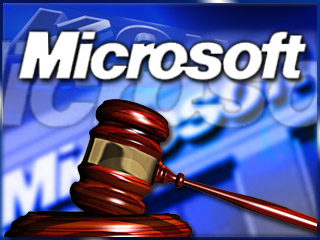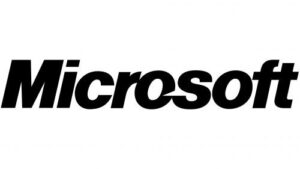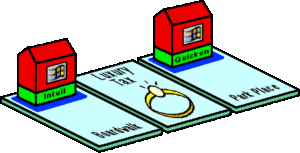Microsoft
Gates Announces Transition from Microsoft
 June 15, 2006
June 15, 2006
Bill Gates, chairman of Microsoft (Steve Ballmer was CEO at this point) announces that he will transition out of his day-to-day role at Microsoft by July 2008 in order to dedicate more time to the Bill and Melinda Gates Foundation.
The Breakup of Microsoft … That Never Happened
June 7, 2000
United States District Judge Thomas Penfield Jackson orders the breakup of Microsoft into two companies: one that will develop operating systems and one that will develop other applications. Microsoft immediately announces that it will file an appeal of the judgment. What would have been a monumental event in the history of the technology industry never actually happens, however. The ruling is overturned just over a year later. Microsoft will be sanctioned, but it stays one company.
Windows Hits Version 2.1
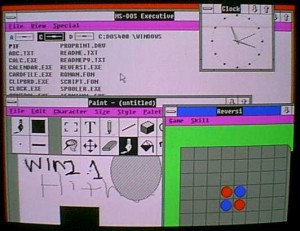
Microsoft releases 2 versions of Windows 2.1 – One for 286 computers and one for 386 computers. Do you remember this version of Windows? No? Not many people do. It wasn’t until version 3 that Windows had any sort of appreciable user base.
Bill Gates’ Internet Tidal Wave
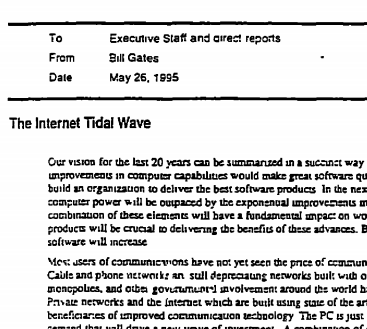
Realizing his company had missed the boat in estimating the impact and popularity of the Internet, Microsoft CEO Bill Gates issues a memo titled, “The Internet Tidal Wave,” which signaled the company’s focus on the global network. In the memo, Gates declared that the Internet was the “most important single development” since the IBM personal computer — a development that he was assigning “the highest level of importance.” Still, it is curious why it took someone who was regarded as a technology “innovator” so long to realize this.
Antitrust Suit Filed Against Microsoft

The United States Justice Department and the Attorneys Generals of twenty states plus the District of Columbia file an antitrust lawsuit against Microsoft. The case focuses on Microsoft’s integration of the Internet Explorer web browser into its Windows 98 operating system. The trial becomes one of the most famous events in tech history, eventually resulting in a settlement between the DOJ and Microsoft. In fact, the sanctions levied against Microsoft lasted until May of 2011, almost exactly 13 years after the suit was filed.
Microsoft Registers Their Domain Name … Finally
Microsoft registers the microsoft.com domain name. For such a major technology company, notably this was over 6 years after the domain name system was created and the first domain name registered, and over 4 years after competitor Apple registered apple.com. I guess it was no surprise that it took Microsoft another 4 years to recognize the growing importance of the “Internet Tidal Wave“, about a year after the World Wide Web was already gaining mainstream popularity and most of the rest of the technology industry were already on board.
Microsoft Acts Mousey
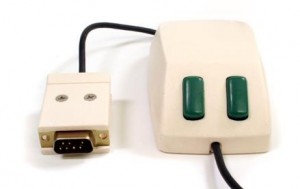
Microsoft introduces the Microsoft Mouse for IBM and IBM-compatible PCs. The mouse featured two green buttons and is available by itself or will later be bundled with the new Microsoft Word software, which Microsoft would release in September. Because of the green buttons, the mouse was nicknamed the “Green-Eyed Mouse”, which may have been a fitting name given it’s similarity to the Shakesperian phrase “green-eyed monster” to describe jealously. It was no secret Bill Gates was very envious of what Apple was creating with the Lisa and later Macintosh computers and their mouse-driven interfaces. Microsoft will manufacture nearly one hundred thousand units of their first mouse, but will only sell five thousand before introducing a second, more popular version in 1985.
Microsoft would go on to create a very successful line of mice and other computing peripherals over the years, but almost ironically Microsoft announced in April of 2023, nearly 40 years later, that they would end the production of Microsoft-branded peripherals and focus on their Surface-branded peripherals. This came months after Microsoft announced a 30% year-over-year drop in revenue from devices, cut 10,000 jobs, and announced “changes to their hardware portfolio”.
Justice Department Blocks Microsoft Purchase of Intuit
The US Justice Department sues Microsoft to block its acquisition of Intuit, Inc. In October of 1994 Microsoft and Intuit had agreed to a $1.5 billion stock swap where Microsoft would acquire the maker of the popular Quicken personal finance software. It would have been the largest software company merger in history at the time. Quicken had approximately 75% of the personal money-management software market. Microsoft’s Money software only had about 5-10% percent. Microsoft had intended to sell Money to rival Novell in order to avoid anti-trust accusations, given that Microsoft had only recently settled a 4-year government investigation into harmful business practices. However the Justice Department was not satisfied with this arrangement and claimed that the combined Microsoft and Intuit would hold too much power over the personal finance market. While initially Microsoft and Intuit remained committed to the deal and vowed to fight in court, less than a month later Microsoft announced it was walking away from the merger.
It is interesting to consider what may have happened if Microsoft had bought out Intuit. Certainly Microsoft would have been a significantly stronger company in the short term. Clearly Intuit’s Quicken and Quickbooks combo of software became the de facto standard for finance software for many years and it would have in theory only become more entrenched had it been under the umbrella of Microsoft. As it stands, Microsoft eventually discontinued Money in 2009.
Windows 98 is Plug and … Whoa?
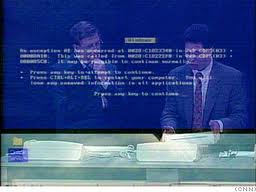
During the COMDEX Spring ’98 and Windows World shows in Chicago, a public demonstration of the soon-to-be released Windows 98 goes awry when Bill Gates’ assistant causes the operating system to crash after plugging in a scanner. Instead of showing the plug-and-play capabilities they were trying to demonstrate, a “Blue Screen of Death” is visible by the entire audience which immediately erupts in laughter. After several seconds, Bill Gates famously responded, “That must be why we’re not shipping Windows 98 yet.”
Ironically, the assistant, Chris Capossela, has moved up the executive ranks at Microsoft, all the way to Executive VP and Chief Marketing Officer. For Microsoft’s sake, hopefully he’ll present a much better marketing image then he did that fateful day!
Windows 3.1 Released
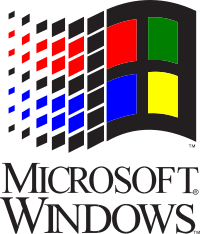
Microsoft releases Windows 3.1, priced at $149.00, selling three million copies over the next two months. Windows 3.1 added multimedia extensions allowing support for sound cards, MIDI, and CD Audio, Super VGA (800 x 600) monitors, and increased the speed of modem it would support to 9600 bps. For many of us that were into computers back in the day, it was the first version of Windows we actually used, as previous versions were still gaining consumer acceptance and Windows 95 wasn’t released until 3 years later.

